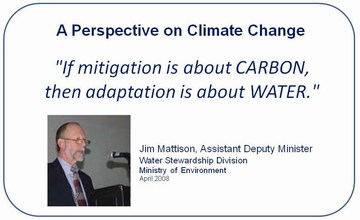Bigger Pipes or Greener Communities: A Hydrological Assessment of using Low Impact Development to Mitigate Future Flooding
Note to Readers:
In October 2010, the Okanagan Basin Water Board (OBWB) and the BC Water and Waste Association are co-hosting a 2-day workshop titled ‘From Rain to Resource: Stormwater Management in a Changing Climate‘. The purpose of Day 2 is to integrate the perspectives of the people working on the ground and those developing and adopting policy.
Chris Jensen, an Infrastructure Resource Officer in the Engineering and Finance Division of the Ministry of Community & Rural Development will report out on the results of the research that he is doing at the University of Victoria as part of his graduate studies.
Climate Change Adaptation is About Water
“The IPCC (Inter-Governmental Panel on Climate Change) predicts that climate change will bring more extreme precipitation to many regions across the globe. This increase significantly raises the risk of rain-generated floods and infrastructure failure,” states Chris Jensen.
 The focus of Chris Jensen’s research is on evaluating whether Low Impact Development (LID) measures can effectively mitigate the increase in flooding that is predicted to occur. The Bowker Creek Watershed, located in Victoria BC, is the case study application.
The focus of Chris Jensen’s research is on evaluating whether Low Impact Development (LID) measures can effectively mitigate the increase in flooding that is predicted to occur. The Bowker Creek Watershed, located in Victoria BC, is the case study application.
To Learn More:
To read the complete story posted on the Rainwater Management Community-of-Interest, click on Bigger Pipes or Greener Communities: A Hydrological Assessment of using Low Impact Development to Mitigate Future Flooding

Posted October 2010

